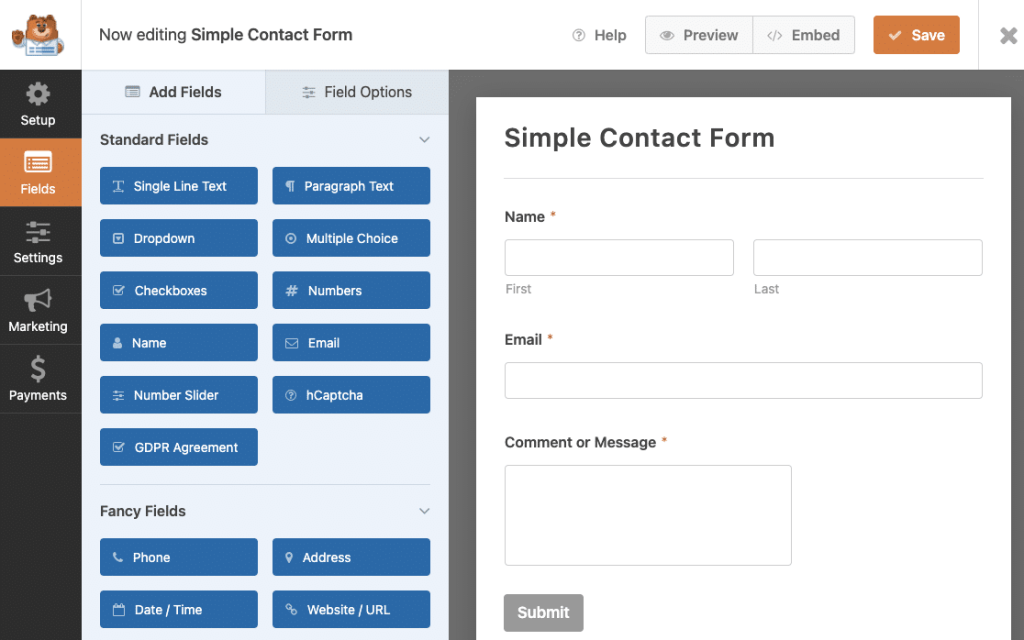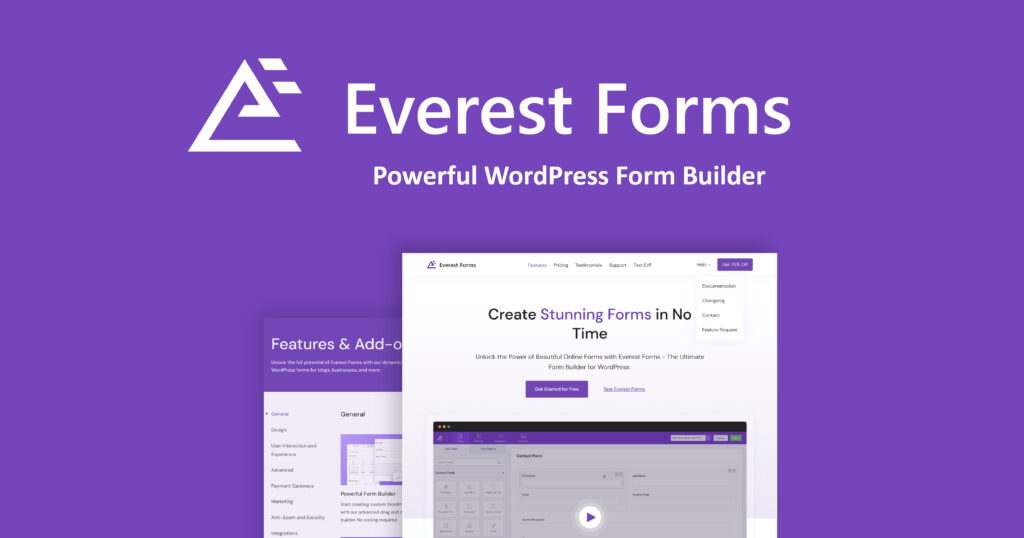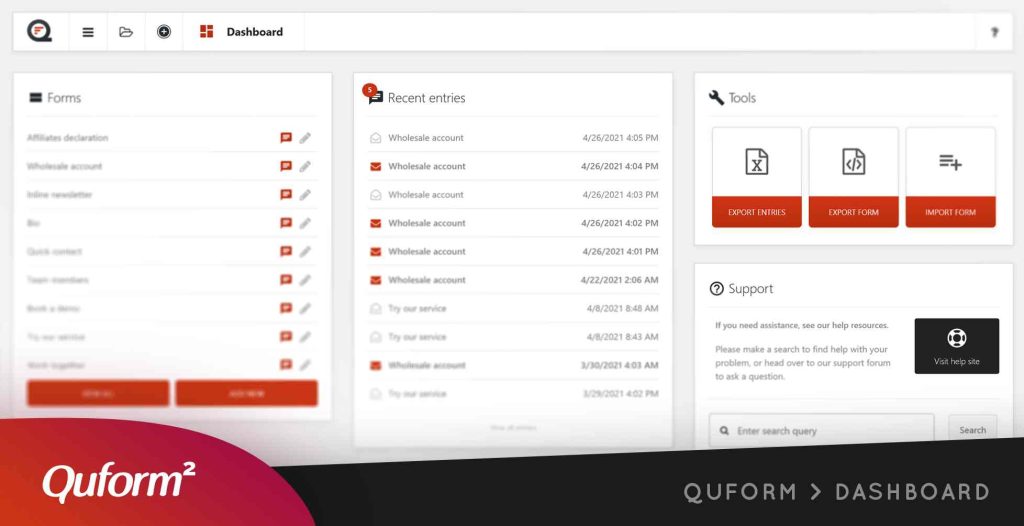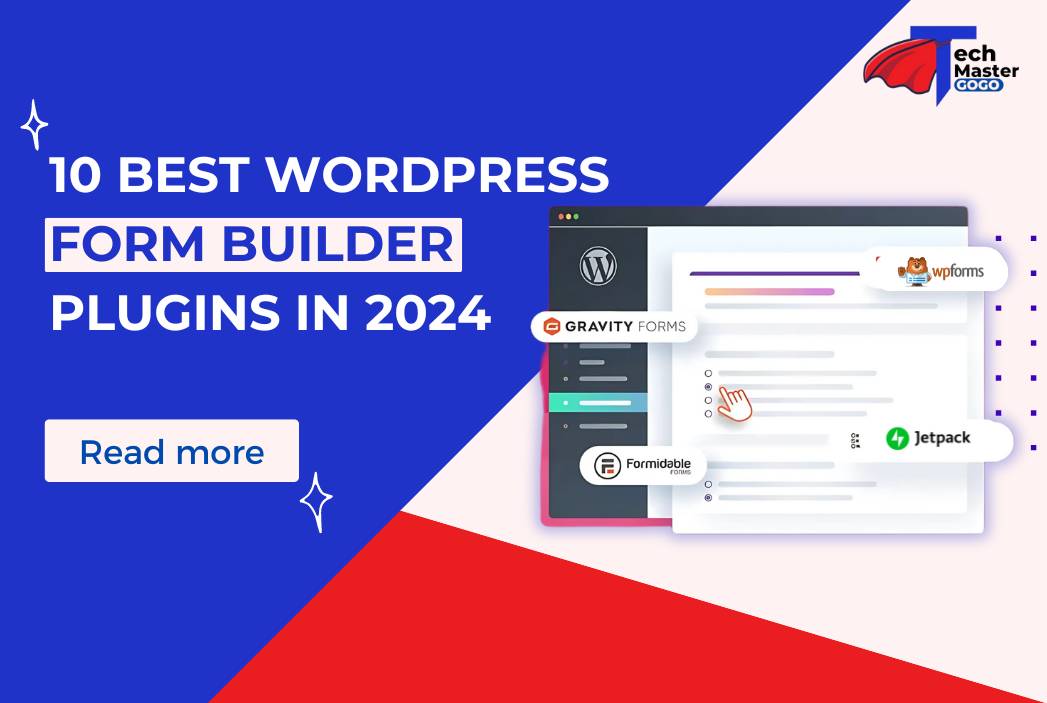Creating forms for your website is essential, whether for contact forms, lead generation, surveys, or even managing bookings. WordPress form plugins help you build and customize forms with ease, providing a user-friendly interface and advanced features. In this article, we’ll explore the 10 best WordPress form builder plugins in 2024, detailing their features, pros and cons, and my personal experience.
1. WPForms

WPForms is widely regarded as one of the most beginner-friendly form builders on WordPress. This plugin allows you to create anything from basic contact forms to advanced, multi-step forms with ease. Its drag-and-drop interface and pre-built templates make it an excellent choice for users who want to build forms quickly without coding skills.
Features:
- Drag-and-Drop Builder: The intuitive drag-and-drop interface is designed for beginners. Simply select form fields, arrange them, and customize to your liking.
- Pre-built Templates: WPForms comes with pre-built templates for contact forms, registration forms, and more. This saves time and effort while ensuring a professional look.
- Smart Conditional Logic: You can show or hide form fields based on user selections. This feature is great for creating interactive forms without overwhelming your users.
- Payment Integrations: Easily integrate PayPal and Stripe to accept payments directly through your forms, perfect for donations or online transactions.
- Multi-Step Forms: Break long forms into multiple pages to improve user experience and increase form submission rates.
- Spam Protection: Built-in honeypots and CAPTCHA help you prevent spam form submissions.
Pros:
- Beginner-Friendly: WPForms is one of the easiest form builders to use, even if you’ve never created a form before.
- Fast Setup: With pre-built templates, you can have a functional form on your site in minutes.
- Responsive: Forms are mobile-friendly, ensuring a great user experience across all devices.
- Powerful Add-Ons: Features like surveys, polls, and email marketing integration can be added via premium add-ons.
Cons:
- Limited Free Version: Many advanced features, like conditional logic, are locked behind the Pro plan.
- Higher Cost for Premium Features: The premium plans can be pricey, especially if you need advanced tools like payment integrations.
My Experience:
As someone who frequently sets up contact forms for different websites, I found WPForms to be incredibly easy to use. The drag-and-drop builder is intuitive, and I particularly liked the conditional logic feature, which helps create dynamic forms that change based on user input. The pricing is a bit steep for premium features, but the ease of use and wide range of functionalities make it worth the investment for most website owners.
2. Gravity Forms

Gravity Forms is a robust form builder plugin designed for more advanced users. While it offers a simple drag-and-drop interface, it shines in its ability to handle complex forms like file uploads, surveys, and quizzes. It’s a powerful tool for developers and businesses that need more than just a basic contact form.
Features:
- Drag-and-Drop Builder: Build forms from scratch or use pre-made templates with an easy-to-use interface.
- Advanced Fields: Includes fields for file uploads, pricing calculations, surveys, quizzes, and user registrations.
- Conditional Logic: Gravity Forms lets you display or hide fields based on the user’s previous answers, making forms more interactive.
- Third-Party Integrations: Integrate with tools like PayPal, Stripe, Zapier, and more to streamline payment collection and automation.
- Developer-Friendly: With built-in hooks and filters, developers can easily extend Gravity Forms for custom functionality.
Pros:
- Highly Customizable: Gravity Forms is perfect for advanced users who need more than just simple contact forms. Its flexibility allows for creating complex forms.
- Third-Party Integration: Seamlessly integrates with a variety of CRMs, email marketing tools, and payment gateways.
- Reliable Support: Offers excellent customer support and documentation to guide users through complex form-building tasks.
Cons:
- No Free Version: Gravity Forms doesn’t offer a free version, which may be a drawback for budget-conscious users.
- Complex for Beginners: While powerful, it might feel overwhelming for users who only need a basic contact form.
My Experience:
I’ve used Gravity Forms for complex forms that require file uploads and conditional logic. The plugin is incredibly flexible, and I love how easy it is to integrate with payment gateways and automation tools like Zapier. However, the lack of a free version means it’s not the best choice for users who just need simple forms.
3. Ninja Forms

Ninja Forms is another popular WordPress form plugin that offers a freemium model, meaning the core plugin is free, but many advanced features are available as paid add-ons. It’s known for its user-friendly interface and drag-and-drop builder, making it ideal for users who need flexibility but don’t want to deal with code.
Features:
- Drag-and-Drop Interface: Easily create and customize forms using a straightforward drag-and-drop editor.
- Form Templates: Start with pre-built templates for different types of forms like registration, contact, or survey forms.
- Conditional Logic: Available as an add-on, this feature allows users to create dynamic forms based on user inputs.
- Multi-Part Forms: Break long forms into sections for a better user experience.
- Third-Party Integrations: Integrate with email marketing tools, payment gateways, and CRMs for enhanced functionality.
Pros:
- Flexible Pricing: You can pay only for the features you need by purchasing individual add-ons.
- Great Free Version: The core plugin provides enough functionality to build simple forms without needing to upgrade.
- Developer-Friendly: Offers a lot of flexibility for developers who want to extend its functionality with custom hooks and filters.
Cons:
- Costly Add-Ons: The cost of individual add-ons can quickly add up, making Ninja Forms expensive if you need multiple premium features.
- Basic Functionality Without Add-Ons: The free version is fairly basic, and users will need to purchase add-ons for advanced functionality like conditional logic or payment gateways.
My Experience:
Ninja Forms strikes a great balance between simplicity and flexibility. The free version was perfect for simple contact forms, but as my needs grew, I appreciated the option to buy only the add-ons I needed. However, if you need multiple premium features, it can get pricey.
4. Contact Form 7

Contact Form 7 is one of the most popular and widely-used WordPress form plugins. It’s completely free and offers the flexibility to create simple contact forms using shortcodes. While it’s not as feature-rich as other form builders, it’s an excellent choice for users comfortable with a bit of coding and customization.
Features:
- Free to Use: Contact Form 7 is entirely free, making it a cost-effective option for users on a budget.
- Spam Protection: The plugin integrates with CAPTCHA and Akismet to prevent spam submissions.
- Simple Form Creation: You can create basic contact forms using shortcodes and embed them anywhere on your site.
- Customization with HTML/CSS: Advanced users can customize forms by adding HTML/CSS.
Pros:
- Completely Free: Contact Form 7 is one of the best free form builders available.
- Highly Customizable: If you’re comfortable using shortcodes and a bit of HTML, you can create fairly complex forms.
- Spam Protection: Built-in CAPTCHA and Akismet support help reduce spam submissions.
Cons:
- Not User-Friendly: The interface is not as intuitive as other drag-and-drop builders, making it harder for beginners to use.
- No Built-In Templates: You’ll have to create each form from scratch or copy from previous forms, which can be tedious.
My Experience:
While Contact Form 7 is free and highly customizable, it’s not the easiest plugin for beginners. I found it useful for basic forms but quickly outgrew it as my form-building needs became more complex. It’s a great budget option, but if you want advanced features, you’ll need to look elsewhere.
5. Forminator

Forminator is a highly versatile and free WordPress form builder plugin that offers a range of features including contact forms, surveys, quizzes, and even payment integrations. It’s particularly attractive for users who want a robust solution without needing to pay for basic features.
Features:
- Drag-and-Drop Builder: Build forms easily with a drag-and-drop interface that requires no coding knowledge.
- Polls and Quizzes: Besides traditional contact forms, Forminator allows you to create interactive polls, quizzes, and surveys to engage visitors.
- Payment Integrations: Forminator integrates with Stripe and PayPal, allowing you to accept payments directly through your forms.
- Conditional Logic: Create dynamic forms that adjust according to the user’s input by using conditional logic.
- Spam Protection: Built-in CAPTCHA and reCAPTCHA options keep your forms spam-free.
Pros:
- Completely Free: Unlike many form builders, Forminator offers a wide range of features, including payment gateways and conditional logic, for free.
- Interactive Forms: The ability to create quizzes and surveys makes it perfect for websites that focus on engagement.
- Beginner-Friendly: The drag-and-drop editor is intuitive, making it easy for even novice users to create complex forms.
Cons:
- Limited Integrations: While Forminator supports payment gateways, it doesn’t have as many third-party integrations as some premium plugins.
- Less Customization for Advanced Users: For users needing highly customized forms, Forminator may feel limiting in its flexibility.
My Experience:
I was impressed with how much Forminator offers in its free version. From payment processing to quizzes, you can create almost any type of form without upgrading to a premium plan. However, its fewer integrations might be a drawback for businesses needing advanced CRM or marketing tools.
6. Everest Forms

Everest Forms is a relatively new yet powerful WP form builder that combines simplicity with flexibility. It’s a freemium plugin that offers drag-and-drop functionality and a host of templates to get your forms up and running in no time.
Features:
- Drag-and-Drop Interface: Like other form builders, Everest Forms allows users to easily create forms by dragging and dropping elements.
- Form Templates: It comes with various pre-designed templates for contact forms, registration forms, and more.
- Multi-Column Forms: You can create complex forms with multiple columns for better layout and design.
- Conditional Logic (Pro): Available in the Pro version, conditional logic allows you to create smart forms that change based on user input.
- File Uploads: Allow users to upload files directly via forms, a handy feature for job applications or customer feedback forms.
Pros:
- Easy to Use: Everest Forms offers an intuitive drag-and-drop builder that makes form creation straightforward, even for beginners.
- Good Free Version: The free version provides all the essentials, including file uploads and multi-column layouts.
- Templates: Pre-built templates simplify the process of creating different types of forms.
Cons:
- Limited Free Features: While the free version is useful, many advanced features like conditional logic and payment integrations are available only in the Pro version.
- Support and Documentation: The support for the free version is somewhat limited, and you’ll need the Pro version for priority support.
My Experience:
Everest Forms is a solid choice for those looking for a WordPress form plugin that balances ease of use with functionality. However, as with many plugins, the most powerful features are locked behind the Pro plan, which can get expensive depending on your needs.
7. Caldera Forms

Caldera Forms is another drag-and-drop WordPress form plugin that makes it easy to create responsive forms quickly. It’s well-known for offering a large number of free features compared to other form plugins, including multi-part forms and conditional logic.
Features:
- Drag-and-Drop Form Builder: Create forms using an easy drag-and-drop interface, allowing you to see form elements in real-time.
- Multi-Part Forms: Break lengthy forms into multiple steps for a more user-friendly experience.
- Conditional Logic: Make forms more dynamic by showing or hiding fields based on user selections.
- Responsive Design: All forms created with Caldera Forms are fully responsive, meaning they work well on both desktop and mobile devices.
- Free Templates: Use pre-built templates to save time when creating contact forms, registration forms, and more.
Pros:
- Feature-Rich Free Version: Caldera Forms offers a wide range of features for free, making it a great option for budget-conscious users.
- Intuitive Interface: The drag-and-drop builder is easy to use and doesn’t require technical knowledge to set up.
- Responsive and Mobile-Friendly: Forms look great on all devices, from desktops to smartphones.
Cons:
- Fewer Integrations: Compared to premium plugins like Gravity Forms or WPForms, Caldera Forms doesn’t offer as many integrations with third-party apps and services.
- Limited Customization for Advanced Users: While it’s great for beginners, users looking for more advanced customization may find it lacking.
My Experience:
Caldera Forms is one of the best free form builders out there, offering more features than many competitors. It’s perfect for users who need a powerful form builder but don’t want to pay for premium add-ons. However, the lack of third-party integrations may be limiting for some businesses.
8. Formidable Forms

Formidable Forms is one of the most advanced form builders available for WordPress, offering a wide array of features for building not just forms, but also data-driven applications like directories, job boards, and calculators. It’s a plugin aimed at developers and power users.
Features:
- Drag-and-Drop Builder: Easily create complex forms with a drag-and-drop interface.
- Views for Data Display: This unique feature allows you to display form submission data on the front end, making it ideal for building directories or listings.
- Conditional Logic: Create dynamic forms that adjust based on user input.
- Advanced Calculations: Build forms with complex calculations, useful for creating order forms or mortgage calculators.
- Multi-Part Forms: Split lengthy forms into multiple sections for better user experience.
Pros:
- Highly Customizable: Formidable Forms offers a wealth of customization options, making it perfect for developers or advanced users.
- Display Form Data: The ability to display submitted data on the front end is a standout feature, especially for more complex websites.
- Responsive and Mobile-Friendly: Forms created with Formidable Forms work well across all devices.
Cons:
- Overkill for Basic Forms: For users who only need simple contact forms, Formidable Forms might feel like overkill due to its complexity.
- High Learning Curve: Because of its advanced features, it might take some time to get comfortable using the plugin.
My Experience:
Formidable Forms is a powerhouse for building complex forms and data-driven applications. However, if you’re only looking for a basic contact form, it may feel too complex and overwhelming. I found it particularly useful when building calculators and directories that required form submissions to display data on the site.
9. Jetpack Forms

Jetpack Forms is part of the broader Jetpack plugin suite, which comes with a set of tools to optimize your website. The forms feature is basic but functional, perfect for creating simple contact forms without needing to install an additional plugin.
Features:
- Basic Form Builder: Easily add forms to your website via the Gutenberg block editor.
- Spam Protection: Jetpack includes spam protection via Akismet integration.
- Simple Integration: Works seamlessly within the broader Jetpack ecosystem, integrating with its security, performance, and marketing tools.
- No Coding Required: Forms are easy to create and add using the default WordPress editor.
Pros:
- Free and Lightweight: Since it’s part of Jetpack, you don’t need to install a separate plugin for forms, saving space on your website.
- Spam Protection: Built-in Akismet spam protection is a great feature for keeping your forms spam-free.
- Easy to Use: Works directly within the WordPress block editor, making it simple to add forms to your posts and pages.
Cons:
- Basic Functionality: Jetpack Forms is very basic and doesn’t offer advanced features like conditional logic or payment integration.
- Limited Customization: The lack of advanced customization options makes it unsuitable for users who need complex forms.
My Experience:
Jetpack Forms is a great option if you’re already using the Jetpack suite and need a simple, no-frills contact form. However, if you need advanced form-building features, it’s best to look at other plugins on this list.
10.Quform

Quform is a premium WordPress form builder plugin designed to offer extensive customization and advanced features, all while maintaining ease of use. The plugin is perfect for users looking to build highly customized forms for registrations, bookings, or complex data collection without needing any coding skills.
Features:
- Visual Form Builder: Quform offers a real-time, drag-and-drop interface that simplifies form creation. You can see your changes live as you build your forms, which is great for both beginners and advanced users.
- Conditional Logic: The plugin allows you to create dynamic forms with conditional logic, displaying or hiding form fields based on user input. This is particularly useful for long forms where you want to show only relevant fields to the user.
- Multi-Part Forms: Break long forms into multiple sections to improve user experience, especially for detailed forms such as event registrations or applications. This feature ensures that users don’t feel overwhelmed by long forms and can fill them out in a structured way.
- Custom Styling Options: Quform provides an extensive range of styling options, allowing you to tailor the appearance of your forms to fit your website’s design. You can easily change fonts, colors, and layouts to ensure the forms blend seamlessly with your branding.
- File Uploads: The plugin supports file uploads, making it suitable for applications, job submissions, or any form requiring document attachments. Users can upload multiple files, which can be stored and managed efficiently through the WordPress dashboard.
Pros:
- Highly Customizable: Quform offers a lot of flexibility when it comes to form design and functionality. You have full control over the look and feel of your forms, which is ideal for users looking for a polished, professional appearance.
- Premium Support: As a premium plugin, Quform provides detailed documentation and priority customer support. This ensures that any issues or questions are resolved quickly, which is helpful for users who may run into technical difficulties.
- User-Friendly Interface: Despite being packed with advanced features, the drag-and-drop interface is intuitive and easy to use. This means you don’t need to be a developer to create advanced forms with conditional logic, file uploads, and other features.
Cons:
- Premium Only: Quform does not offer a free version, which might be a drawback for users looking for a no-cost solution. The one-time fee, however, covers all features, so there are no recurring costs.
- Steeper Learning Curve for Advanced Features: While the basic features are easy to use, advanced options like conditional logic and custom styling may require some time to learn, especially for users who are not familiar with more complex form-building tools.
Pricing:
- Single Site License: $29 (one-time payment), which includes all premium features and future updates.
My Experience:
Quform stands out as an excellent choice for building highly detailed, professional forms without much hassle. The visual form builder was a major plus for me, as it allowed real-time adjustments, making it easy to experiment with different form layouts. The conditional logic feature worked smoothly, and the ability to customize every aspect of the form’s appearance was impressive. Quform’s flexibility makes it perfect for users who need complex forms with advanced features, such as job application forms with file uploads or multi-step forms for detailed user submissions.
However, if you’re only looking for a simple contact form or a free option, Quform might feel like overkill due to its premium pricing. For users who need powerful, customizable forms, it’s well worth the one-time investment.
Conclusion
In 2024, the landscape of WordPress form builder plugins offers a variety of tools catering to different needs—from simple contact forms to complex, dynamic forms with file uploads and payment integrations. WPForms remains a top choice for beginners due to its user-friendly interface, while Gravity Forms excels for advanced users who need greater customization. Ninja Forms and Forminator offer flexibility for those looking for robust, free options, while Quform provides premium, advanced features for professionals who need polished, customizable forms.
Ultimately, the best WordPress form plugin for you will depend on your specific requirements, budget, and level of expertise. Whether you’re a beginner looking for something simple, or an advanced user in need of dynamic and complex forms, there’s a solution on this list for you.




